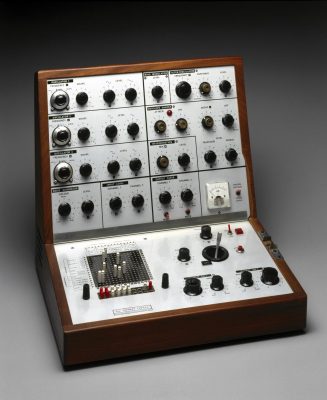For young viewers of early Dr. Who, the most famous track created by The Radiophonic Workshop will always be inextricably linked with memories of peeking out at Cybermen from behind their sofa. The pulsing rhythms of Delia Derbyshire’s theme tune went on to represent the beginnings of The Workshop’s unique form of early electronica. This pioneering music studio had been set up by a group of BBC employees as demand had grown for innovative synthetic music and sounds for radio and television. Through developing these sounds The Workshop would go on to inspire musicians from across the world and create a new genre of synthetic soundscapes.
Although the Dr. Who theme tune is the best known piece to emerge from The Radiophonic Workshop, the studio produced an enormous amount of incidental music, sound effects and jingles that sound-tracked BBC TV and Radio from the late 1950’s to the 1990’s.
Now The Radiophonic Workshop are launching their first studio album in 32 years – Burials in Several Earths. The Science Museum recently opened Mathematics: The Winton Gallery and The Workshop’s album launch presented the perfect opportunity to invite them to the Science Museum to explore the mathematical side of electronic music.
Our permanent collection holds some fantastic gems from the early days of electronic music in Britain. In 2010 the Museum acquired the Oramics machine, invented by one of The Radiophonic Workshop founders, Daphne Oram.

The Radiophonic Workshop’s array of new sounds inspired artists and electronic musicians including the Beatles and the Electronic Music Studios (EMS). Visitors to our Making The Modern World gallery can see an example of the EMS VCS 3 synthesizer, another piece of British music history which was popular with progressive rock stars including Brian Eno, Pink Floyd and The Who.

At the heart of British electronic music history is a group of engineers and artists who enjoyed tinkering with synthetic sound. Their understanding of wave-forms and wiring is just one example of the creative paths that an understanding of mathematics can lead musicians and artists down.
Join us on Friday 16th June to hear The Radiophonic Workshop live in surround sound and take part in a Q&A with Dr.Tim Boon the Museum’s Head of Research & Public History and The Radiophonic Workshop. Mathematics Gallery: The Winton Gallery will be also be opened exclusively to ticket holders on the night.
